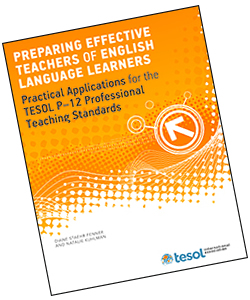Advocacy Update:
The Quarter in Review
by John Segota
 Between August recess and time focused on the election, there has been little action on major legislation in the U.S. Congress. However, there have been other developments relating to education policy in Washington, DC. Here’s a brief overview:
Between August recess and time focused on the election, there has been little action on major legislation in the U.S. Congress. However, there have been other developments relating to education policy in Washington, DC. Here’s a brief overview:
U.S. House of Representatives Debates English-Only Legislation
Right before breaking for August recess, the House Committee on Judiciary, Subcommittee on the Constitution, heard H.R. 997, “The English Language Unity Act of 2011.” The proposed legislation is one of a handful of bills that would make English the official language of the United States. Specifically, H.R. 997 would require the federal government to conduct official functions, whether in the private or public sector, only in English, and would also require naturalization candidates to understand the Declaration of Independence and the Constitution.
Although a handful of English-only bills are typically introduced at the beginning of each Congress, this is the first time in several years there has been a hearing on this issue. In fact, news of the hearing came as somewhat of a surprise to many since this issue has not seen much (if any) traction in recent years.
No vote was taken on the bill, and no markup session has been scheduled. Get a summary of the hearing.
U.S. Senate Examines Impact of Sequestration
At the end of July, the Senate Appropriations Subcommittee on Labor, Health and Human Services and Education (LHHS) held a hearing on the impact of the pending cuts on domestic discretionary spending scheduled for January 2013. Also known as sequestration, the mandatory cuts are a result of the deals negotiated as part of Budget Control Act passed by Congress in 2011.
According to Secretary of Education Arne Duncan, the first witness to testify, if the sequester occurs on 2 January 2013, all education programs with the exception of Pell Grants will be cut by 7.8%. The impact of those cuts will be felt immediately by Impact Aid recipients; however, recipients of Title I, Title III, Career and Technical Education, and other formula grant programs to states will not be impacted until school year 2014-2015.
Duncan emphasized that these cuts would stop education reform in its tracks as states, also facing severe budget shortfalls, will be unable to fill in the gaps. Calling education “the cornerstone to our economy,” Duncan pleaded with the Members present to develop a balanced approach to deficit reduction rather than allowing the deep, indiscriminate cuts that sequestration would require. Following the Secretary’s remarks, a panel of state education officials spoke about the impact sequestration would have on their individual budgets.
Read a summary of the testimony presented at the hearing, including a recorded webcast of the hearing.
Education Secretary Arne Duncan Presents Annual “Back to School” Address
On 2 October 2012, Secretary of Education Arne Duncan delivered his annual “Back to School Address” at the National Press Club. His speech, titled “Moving Forward, Staying Focused,” was given to an audience that included education reporters, stakeholders, and Department of Education (ED) staff. He spoke about the successes that education has had over the past three and a half years and the challenges that our country faces towards improving educational outcomes.
In his address, Secretary Duncan discussed his recent 3-week back-to-school, cross-country bus tour, ESEA flexibility waivers, and updates on Race to the Top. He also outlined the priorities for the U.S. Department of Education, including closing the skills gap, reforming career education, more support and training for principals and teachers, and passage of the DREAM Act.
Get a summary of Secretary Duncan’s speech.
Presidential Candidates Educational Platforms
With the U.S. general election just around the corner, the presidential campaigns have been providing more detailed information on each candidate’s platform. Get a summary of the education platforms of President Barack Obama and Governor Mitt Romney.
TESOL Blogs
TESOL Blogs need your expertise!
-
Have a great idea for the classroom?
-
Want to share your experiences?
-
Do you have knowledge to share?
Contact Craig Triplett or Tomiko Breland with your idea or for details.
Read the TESOL Blog.
TESOL Bookstore
Preparing Effective Teachers of English Language Learners:
Practical Applications for the TESOL P-12 Professional Teaching Standards
Special Offer—save 20% on orders through 1 March 2013
ENTER code: Title3
 Preparing Effective Teachers provides comprehensive guidelines for creating, revising, and accrediting ESL programs and for professional development of all teachers who work with English language learners
Preparing Effective Teachers provides comprehensive guidelines for creating, revising, and accrediting ESL programs and for professional development of all teachers who work with English language learners
Authors Diane Staehr Fenner and Natalie Kuhlman bring their extensive knowledge of the Standards and offer step-by-step applications using the five domains of Language, Culture, Instruction, Assessment, and Professionalism. Readers find new directions, ideas, and ways of thinking about how programs prepare teachers who teach English language learners in the United States as well as around the world.
NEW Pricing: List $69; Member $55
Order from the TESOL Bookstore
Toll Free: 888-981-0041
E-mail: tesol@brightkey.net
Order #738
ISBN 9781931185738
"As we raise the bar for our P–12 students, we must also do so for the programs that prepare our teachers. I congratulate TESOL on this timely and practical volume."
James Cibulka, President
National Council for Accreditation of Teacher Education
and Council for the Accreditation of Educator Preparation
". . . Most important, this book provides a framework for professional development programs that is built on the TESOL P–12 Professional Teaching Standards that will benefit ESL as well as content-area teachers."
Margarita Calderon, PhD
Professor Emerita/Senior Research Scientist
School of Education, Johns Hopkins University